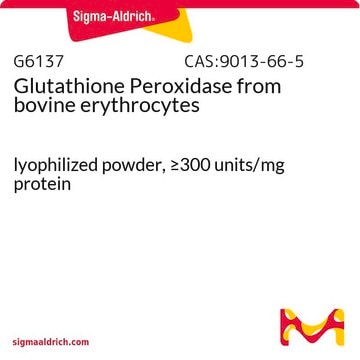G4013
Glutathione Peroxidase from human erythrocytes
lyophilized powder, ≥30 units/mg protein
Synonym(s):
GSH-Px, Glutathione:hydrogen-peroxide oxido-reductase
Sign Into View Organizational & Contract Pricing
All Photos(1)
About This Item
CAS Number:
MDL number:
UNSPSC Code:
12352204
Recommended Products
form
lyophilized powder
specific activity
≥30 units/mg protein
composition
Protein, 13-25% modified Warburg-Christian
UniProt accession no.
shipped in
dry ice
storage temp.
−20°C
Gene Information
human ... GPX1(2876)
General description
GPX1 (glutathione peroxidase 1) belongs to the four membered family of GPXs, including GPX2, GPX3 and GPX4. It is a selenocysteine-containing protein. GPX1 is the major isoform of GPX enzyme and is ubiquitously present intracellularly.
Note: At the reported pH optimum of 8.8, we have found the activity to be approx. 10 times that at pH 7.0. However, to remain consistent with literature and avoid complications arising from non-enzymatic oxidation of GSH, our unit is defined at pH 7.0.
Application
Glutathione peroxidase (GPX) from human erythrocytes has been used for the determination of the ability of peroxides to inactivate GPX in epithelial sheets obtained from cutaneous squamous cell carcinoma (CSCC) or solar keratoses (SK).
Biochem/physiol Actions
GPX1 (glutathione peroxidase 1) catalyzes the conversion of multiple organic and inorganic peroxides, by utilizing reduced glutathione (GSH) as an electron donor. This enzyme is also responsible for the removal of organic and inorganic peroxides.
Unit Definition
One unit will catalyze the oxidation by H2O2 of 1.0 μmole of reduced glutathione to oxidized glutathione per min at pH 7.0 at 25 °C.
Physical form
Lyophilized powder containing 25% sucrose, 3% dithiothreitol, and sodium phosphate buffer salts
Signal Word
Danger
Hazard Statements
Precautionary Statements
Hazard Classifications
Resp. Sens. 1
Storage Class Code
11 - Combustible Solids
WGK
WGK 3
Flash Point(F)
Not applicable
Flash Point(C)
Not applicable
Certificates of Analysis (COA)
Search for Certificates of Analysis (COA) by entering the products Lot/Batch Number. Lot and Batch Numbers can be found on a product’s label following the words ‘Lot’ or ‘Batch’.
Already Own This Product?
Find documentation for the products that you have recently purchased in the Document Library.
O L Gostukhina et al.
Zhurnal evoliutsionnoi biokhimii i fiziologii, 48(6), 542-547 (2013-02-14)
The work studied the content of carotinoids, the state of antioxidant (AO) enzymatic complex, and intensity of lipid peroxidation in tissues (hepatopancreas, gill, foot) of the Black Sea bivalve mollusc Anadara inaequivalvis. Tissues with a high content of the pigment
Hai-Dong Yao et al.
The Journal of nutrition, 143(5), 613-619 (2013-03-22)
Dietary selenium (Se) deficiency causes muscular dystrophy in various species, but the molecular mechanism remains unclear. Our objectives were to investigate: 1) if dietary Se deficiency induced different amounts of oxidative stress, lipid peroxidation, and cell apoptosis in 3 skeletal
Bing-Lin Zhang et al.
Environmental toxicology and chemistry, 32(6), 1420-1425 (2013-02-19)
The effect of sodium chloride (NaCl) on cadmium (Cd) uptake, translocation, and oxidative stress was investigated using 2 tobacco cultivars differing in Cd tolerance. The growth inhibition of the tobacco plants exposed to Cd toxicity was in part alleviated by
V A Makarchuk et al.
Ukrains'kyi biokhimichnyi zhurnal (1999 ), 85(1), 71-78 (2013-03-29)
In experiment on laboratory rats the models of acute and chronic pancreatitis were developed to study the changes of lipoperoxidation-antioxidant protection system depending on morphological changes of the pancreas. The acute and chronic pancreatitis is accompanied with intensification of lipoperoxidation
Jennifer Walshe et al.
Cancer research, 67(10), 4751-4758 (2007-05-19)
Cutaneous squamous cell carcinomas (CSCC) are a common malignancy of keratinocytes that arise in sites of the skin exposed to excessive UV radiation. In the present study, we show that human SCC cell lines, preneoplastic solar keratoses (SK), and CSCC
Our team of scientists has experience in all areas of research including Life Science, Material Science, Chemical Synthesis, Chromatography, Analytical and many others.
Contact Technical Service








